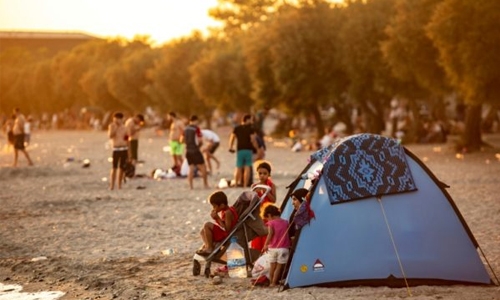Syrian refugee crisis, the biggest since WW II: DERASAT Chairman
The Syrian refugee crisis has become a global humanitarian crisis “on a scale we have not seen since World War II or the partition of India,” said a top DERASAT official. The crisis, a “daunting challenge for the global community”, is also straining the “economies of Greece and many other countries,” said Dr Shaikh Abdulla bin Ahmed Al Khalifa, the Chairman of the Board of Trustees of the Bahrain Center for Strategic, International, and Energy Studies (DERASAT).
He was addressing a workshop organised to discuss the challenges of internally displaced Syrians or those left the country due to brutality of war. “Since the start of the Syrian civil war in 2011 at least 13.1 million people required humanitarian assistance,” said Dr Shaikh Abdulla bin Ahmed Al Khalifa. He, however, warned the “numbers alone can never truly illustrate the human tragedy at the heart of this issue.”
Of the 13.1 million “six million are internally displaced,” he said adding: “Another five million have crossed borders.” “Of those, approximately 3.6 million have landed in Turkey, a million in Lebanon, over 650,000 in Jordan and over a million in the European Union.” These numbers, the DERASAT Chairman said, are alarming and portray the enormous scale of the crisis. “Some would go as far as to argue that the politics of many European countries have shifted irreversibly due to the migrant crisis, much of whom are Syrian refugees,” he said during the half-day workshop.
The workshop, which presented a platform for Western nations to clarify their position on the crisis, was attended by experts and senior officials from the UN ESCWA, UN-Habitat, World Bank, research centres, non-governmental organisations as well as government officials. Bahrain, Dr Shaikh Abdulla stressed, has never hesitated in assisting its Syrian brethren. “Under direct orders from His Majesty the King, the Royal Charity Organisation has done much to protect and provide for the needs of Syrian refugees.”
Bahrain, he said, built schools and hospitals, as well as water wells for clean drinking water. “In Jordan, Bahrain has built an educational complex with four separate schools that can collectively teach 9,600 pupils.” In cooperation with UNICEF, water well, hospital, as well as 3,000 housing units were built by Bahrain in Jordan.
“Under the directives of His Majesty the King, Bahrain donated $20 million to the refugees’ cause.” “All of the above and much more have been achieved by working with the respective governments, the UN and NGOs,” said Dr Shaikh Abdulla.
Turkey issues warning
Meanwhile, in another development yesterday Turkish President Tayyip Erdogan warned Europe that it would start allowing Syrian refugees to flee to Europe if Ankara did not get more international support. Turkey is home to more than 3.6 million Syrian refugees and recently called for a “safe zone” in the war-torn country’s northeast, to which refugees could return. If the safe zone does not happen, “we will be forced to open the doors. You either give support, or if you won’t, sorry, but we can only put up with so much,” Erdogan said.
“Are we going to shoulder this burden alone?” he asked during the televised speech in Ankara. Erdogan claimed Turkey had spent $40 billion on refugees and criticised the West, especially the European Union, for failing to live up to its promises. Under a 2016 agreement, the EU promised Ankara six billion euros ($6.6 billion) in exchange for stronger controls on refugees leaving its territory for Europe, but Erdogan said only three billion euros had so far arrived. “We may be forced to do this (open the gates) to get this (international support),” he said.
EU Commission spokeswoman Natasha Bertaud denied the claim later on Thursday, telling reporters in Brussels that the EU had provided 5.6 billion euros to Turkey under the agreement, with “the remaining balance due to be allocated shortly”. Turkey fears a fresh influx of refugees as the Syrian government advances into the last rebel stronghold of Idlib. It also hosts hundreds of thousands of Iraqis and Afghans fleeing conflict in their countries.
Related Posts

